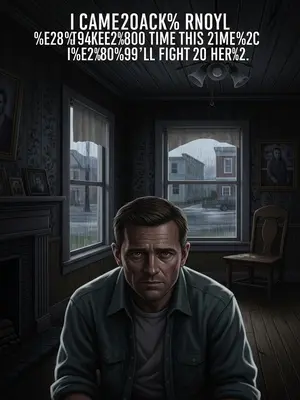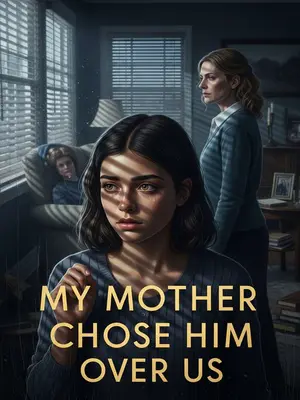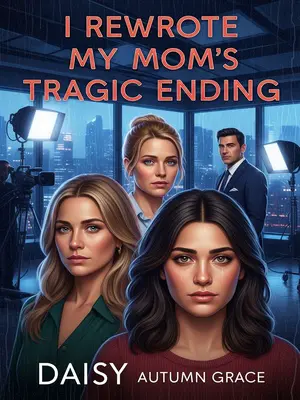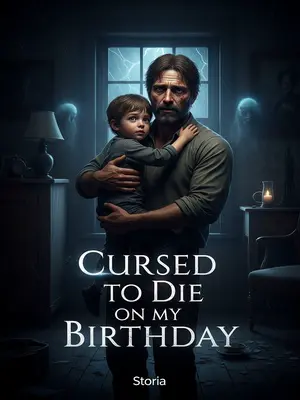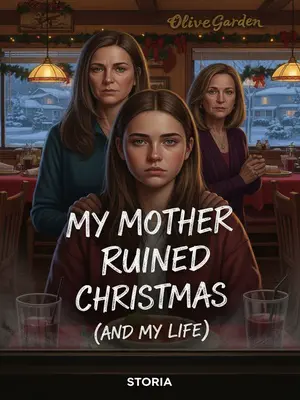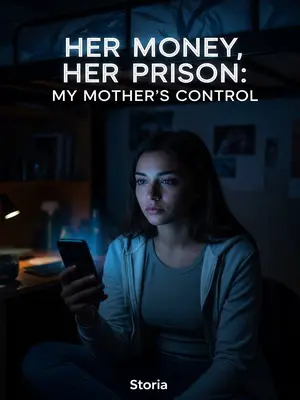Chapter 2: The Price of Suffering
In the house, the sound of sobbing mixed with the dull thud of a broom handle hitting skin.
It was just another Tuesday after school, the late sun turning the kitchen window gold, the TV murmuring some game show in the other room, the smell of overcooked meatloaf hanging in the air. I ignored it, hunched over my homework at the kitchen table, already numb to scenes like this.
I traced the edge of my worksheet, every word muffled by the familiar soundtrack of pain. There was nothing new about it. I’d learned how to block it out, the way some folks stop hearing the trains at night.
Mom was infamous throughout our little Ohio town as a jinx. Grandma said she had the fate of a "hard-luck woman."
Her reputation had legs—whispers at the Dollar General, side-eyes in the church pews. If a neighbor’s truck broke down, or someone’s dog got sick, they’d mutter, "That Johnson woman walked by my yard again." The rumor mill never let up.
The more you hurt her, the better off you’d be. The more you cursed her, the luckier your days got.
Grandma swore by it, as if it was written in the Bible. She even told folks about it at bingo night, laughing as if she was sharing a secret recipe.
It was harvest season again in our greenhouse. To make sure the thousands of pounds of tomatoes sold high, Grandma stopped bothering with church. Instead, she locked Mom in a room and beat her mercilessly.
I could smell the tomatoes ripening on the vine through the back door, the thick green tang mixing with the sharp scent of bleach, flies buzzing around the screen door. The greenhouse meant money, meant everything, and Grandma would sacrifice anything for a good sale—even her place in a church pew.
"You jinx! Hurry up and bless us so our tomatoes sell tomorrow, or I’ll come back and beat you senseless."
She’d yell it loud enough for the neighbors to hear, like she wanted witnesses to her superstition. The threats had become a kind of twisted ritual, like knocking on wood—except the wood was Mom’s skin.
Mom’s moans grew quieter.
They faded like static from an old radio, sometimes replaced by silence that was somehow worse.
Grandma yanked her hair and slapped her face. Mom’s cheeks were always bruised, never a spot untouched.
Her hair hung in limp, oily strands. Sometimes, I’d find bits of it clinging to the old rug. There wasn’t a day when her face didn’t look like she’d gone three rounds with the world.
Dad lounged in a recliner, smoking, totally indifferent.
He’d flick his ashes into a Mountain Dew can, watching reruns with the volume up high, his eyes glazed over. If the house burned down around him, I doubted he’d move.
To them, every one of Mom’s cries was like the sound of a slot machine paying out.
It was transactional, the way they talked about it. Like her pain was just another currency, traded for whatever windfall they wanted next.
"Jason, get your grandma some water. Don’t just stand there like a lump!"
Her voice cut through the house, sharp as a steak knife. I set my pencil down and got up, the floorboards creaking under my feet.
I filled a glass from the tap, paused, then swapped it for cold water instead.
I hesitated at the sink, the water running too long, thinking about last time. My hand shook, but I remembered: cold was safer.
Last time, when I brought hot water, Grandma had poured it straight down Mom’s throat, burning her so badly she almost died.
I still had nightmares about it—the smell of burnt flesh, the sound of Mom choking. I could never forget the look on Grandma’s face, like she’d just killed a spider on the porch.
That was the first time I saw Dad and Grandma genuinely anxious about Mom.
They hovered by the hospital bed, arguing over insurance deductibles and luck running out. For a second, fear cracked their masks.
"Ma, take it easy next time. If you kill her, we’ll lose our good luck charm."
His voice was low, almost a plea. It made my skin crawl, the way he talked about her—like a broken horseshoe or a lost lottery ticket.
Grandma grumbled, "Guess I got carried away. I’ll be more careful next time."
She acted annoyed, like someone who’d overwatered her plants. Her voice was rough, but for once, she left the room in silence.
I stood outside the hospital room, watching Mom lying in bed, my heart twisted up inside.
The walls were pale green, the air cold. I pressed my forehead to the window, wishing I could swap places with her, or at least pull her out of this place for good. My chest ached like I’d swallowed broken glass.
Later, the doctor said she’d pull through. Dad and Grandma beamed. I couldn’t even smile. Maybe Mom didn’t want to wake up.
I watched her chest rise and fall, her lips cracked and gray. She didn’t open her eyes, not even when the nurse called her name. Maybe, deep down, she’d finally decided she’d had enough.
When Grandma wouldn’t stop, I slipped out back and opened the goat pen.
I made it quick, hands trembling as I unlatched the gate. The goats bolted for freedom, bleating their heads off, knocking over flower pots on their way to the neighbor’s yard.
Soon, Aunt Sarah next door shouted, "Hey, the Johnsons’ goats are out again!"
Her voice rang through the evening air. Neighbors stepped out onto their porches, and for a moment, everyone’s attention was off the house.
Grandma and Dad rushed outside to chase the goats, and Mom was spared more beating, at least for now.
I watched through the kitchen window as they scrambled around, cursing and chasing the goats with old broomsticks. The chaos felt like a strange kind of relief.
I snuck into the room and helped Mom to the bed. Blood stained my hands, and I felt useless.
Her weight sagged into my arms. I whispered, "It’s okay, it’s over for now," as I tried to clean her up. My stomach churned at the sight of her blood, a sticky, metallic smell filling the air.
Back then, when Mom was getting beaten, I’d try to shield her.
There were times I’d stood in the doorway, arms spread wide, hoping they’d just see me for once. It never worked. If anything, it just doubled the violence.
What shook me most was that Mom never wanted me to protect her; she’d shove me away and curse me instead.
Her voice would cut through my pleas: "Go away. Don’t make it worse. Just leave."
"How did I end up with a son like you? Get out."
Sometimes, she’d spit the words, eyes burning. Other times, her voice was flat, empty. I never knew which was worse.
Eventually, I stopped trying. I realized it was useless. Trying only made things worse for both of us.
I learned to watch from the shadows, biting my tongue, letting the shame fester in my chest.
Looking at her blank expression, I quietly dabbed her wounds with antiseptic. We didn’t speak.
The silence was heavy, broken only by the distant sound of laughter outside. I wished I could say something—anything—that would matter. Instead, I just worked, careful not to make her flinch.
When Grandma and Dad came back from chasing the goats, it was already evening. They muttered that the tomatoes would definitely fetch a good price tomorrow.
Their clothes were covered in dirt and goat hair, their hands sticky with sweat. They sat at the table, counting tomorrow’s luck before it had even arrived.
I stayed with Mom in the cold, windowless back room, falling asleep to the sound of mice scurrying in the walls.
I wrapped us both in my old quilt, pulling it up to my chin. I could smell the must and dust, hear the soft scrabble of paws behind the drywall, and for a moment, I imagined we were somewhere else, anywhere but here.
But I couldn’t shake the thought: what if Mom’s luck was just the start of something worse?


